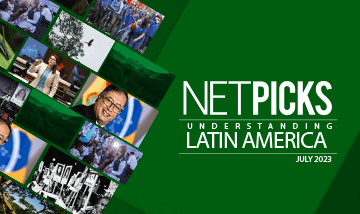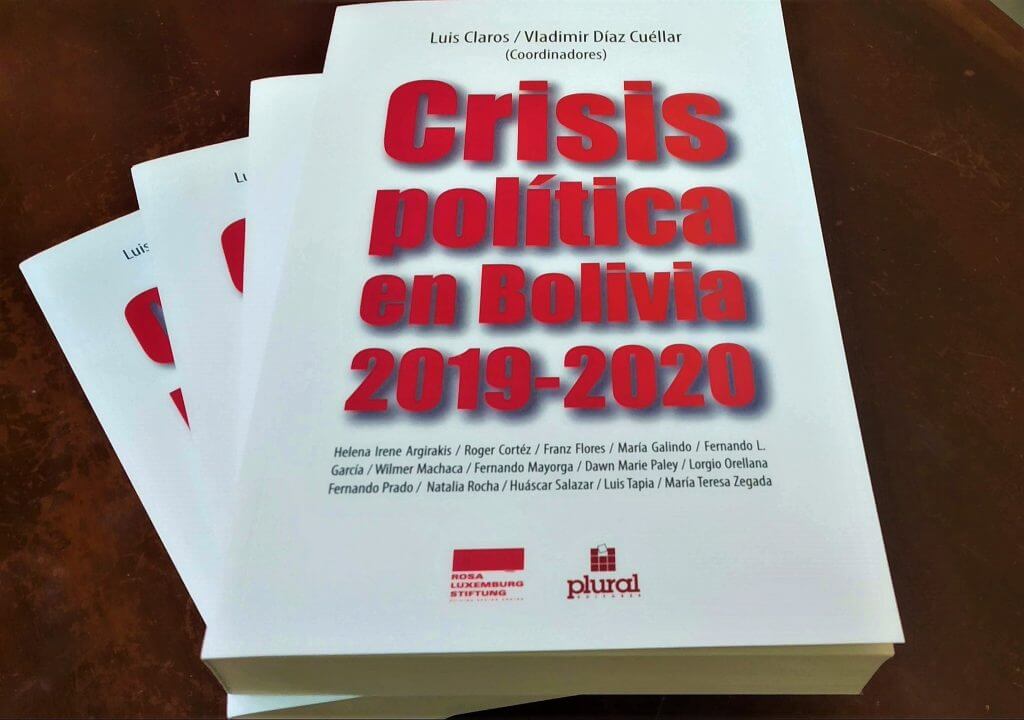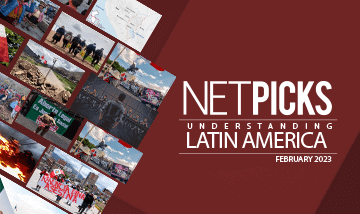A Small Step to the Center Brings Opportunity for the Left

Índice
Presidential Elections in Colombia
On June 17, Colombia will elect its president for 2018-2022. After the first round of the election, two men will face each other in the runoff: Iván Duque, representing the right, and Gustavo Petro, for the left. Results from the first round of the election, held on May 27, evidence several changes in Colombia’s political dynamics, while other trends remain the same. These reflections are discussed in this article.
- Specifics
In runoff election, Iván Duque of the Center Democratic Party, representing the various right-wing tendencies of Colombia, will be facing off against Gustavo Petro, former mayor of Bogotá, representing leftist and working-class sectors. In the first round, Duque received 39.14% of votes (7,569,693)[1], while Petro obtained 25.08% (4,851,254).
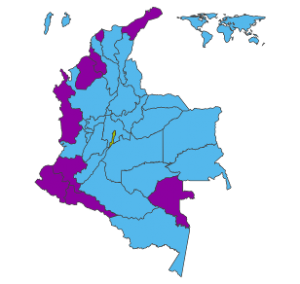
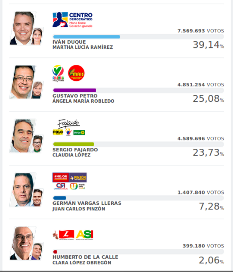
There were two big surprises on election day: i) a significant show of support for the former mayor of Medellin, mathematician Sergio Fajardo, a centrist candidate who received 23.73% of the vote (4,589,696 votes in total, only 261,558 fewer than Petro), and ii) rather limited support for former president Germán Vargas Lleras, who had seemed to have the political machinery on his side, but only garnered 7.28% of votes (1,407,840). While many talk about the high levels of polarization in the country, the truth of the matter is that the runoff election will be decided by the centrist voters, and, if one of the two candidates is able to excite the electorate, traditional non-voters, who total 17,420,226, the equivalent of 46.62% of Colombia’s eligible voting population.
- Who’s who?
Iván Duque. “The one Uribe says.”
Given their similarities, both in terms of ideology and proposals, a group of political forces came together to fight on a united front in this election: the Conservative Party (one of the two long-standing parties in Colombia, with a close relationship to the Catholic Church, and which has been represented by 22 presidents), the Central Democratic Party, and Alejandro Ordoñez, an independent candidate (former solicitor general who was removed from office for influence peddling; he is an active member of the SSPX Church).[2]. Together, they held a primary election to decide on a candidate to represent them all. On March 11, on the date of the parliamentary elections, this primary election ended with Senator Iván Duque as the winner, garnering 4,032,736 votes, also choosing Martha Lucia Ramírez (former minister of defense under Uribe and also a minister under Pastrana) as the running mate.
This coalition is based on defending institutions, tradition, and social and economic and social conservatism, and has waged its fight against what amounts to the ghosts of Castro and Chavez in Colombia. The group has been vocal in its criticism of the Havana peace accords, claiming that they have resulted in impunity and that crimes against humanity have gone unpunished. Their political movement alleges that instead of punishment, the FARC (Common Alternative Revolutionary Force) have been awarded parliamentary representation.[3].
This coalition played to votes from Liberal Party’s regional patronage structures (the Liberal Party is the other long-standing Colombian political party, which represented political liberalism in the 19th century and boasts 14 former presidents), as well as from the Radical Change Party (founded in 1998, which includes parts of what used to be the Liberal Party and regional political movements; it has connections to the paramilitary). These parties themselves ended up receiving only a small number of votes. The Liberal Party, represented by the La Paz negotiator Humberto de la Calle received only 399,180 votes, while the official candidate for the Radical Change Party was President Santo’s former vice president, Germán Vargas Lleras.
Iván Duque is the son of a well-known family from Antioquia. Attorney. Worked for the Inter-American Development Bank upon the personal recommendation by Juan Manuel Santos (2001-2013). Senator for the 2014-2018 period, representing the Central Democratic Party.[4], Duque resigned his senate seat to run for president. In December 2017, the party ran an internal survey and ended up giving him their presidential nomination. Iván Duque’s candidacy was openly and strongly supported by Alvaro Uribe Velez.
Sergio Fajardo (62). “I am a teacher”
Coalition Colombia is a political alliance that was created under an agreement between three parties: the Green Alliance Party, the Alternative Democratic Pole, and the Citizen Commitment Civil Movement. This alliance focused its efforts on fighting corruption and a new code of ethics for politics. Green Alliance Senator Claudia López, Democratic Pole Senator Jorge Robledo (the longtime political adversary of Alvaro Uribe Vélez), Senator-elect (2018-2022) and former Bogotá Mayor Antanas Mockus, and other famous Colombian intellectuals were behind this campaign. Fajardo’s candidacy was not the result of an internal decision by the political parties involved, but rather an agreement between their leaders. The agreement was not an easy one to reach, since Robledo, López, and Fajardo were all interested in being presidential candidates. Within the coalition, the Democratic Pole’s support became blurred, as best evidenced by the campaign colors (green). Major differences of opinion and debate arose within the party, as many of its members decided to support Gustavo Petro in the first round of the elections, arguing that Coalition Colombia did not represent the Pole’s opposition-based, leftist ideology.
Sergio Fajardo is also from Antioquia. Mathematician and university professor. Medellín Mayor (2004-2007) and Antioquia Governor (2012-2015). He was Antanas Mockus’s running mate in 2010 (vice presidential candidate).
“My name is Gustavo Petro and I want to be your president.”
As Coalition Colombia was coming together in December 2017, Gustavo Petro insisted that the various centrist and leftist political forces should come together to choose a single presidential candidate for 2018 to participate in the elections with a united front. However, disagreements within the Democratic Pole[5], especially within the sector represented by Senator Jorge Robledo, as a result of the heady presidential campaign launched by former senator Piedad Córdoba (who ran under the Citizen Power Party, but dropped out in April), and also because of the Green Alliance Party’s placing its hopes on its most visible face, Claudia López, and also due to Fajardo’s own belligerence, the multi-party primary only included Gustavo Petro for Human Colombia and former Santa Marta Mayor Carlos Caicedo. This primary was also held on March 11, and Gustavo Petro was the clear winner. That day, Petro was also endorsed by six newly-elected parliamentary representatives from the “list of decency” group, which during those elections included the Patriotic Union (a leftist party that had suffered political genocide back in the 80’s), the Alternative Indigenous and Social Movement (MAIS – a party that included the highly politicized and autonomous sectors of various indigenous communities), and the Independent Social Alliance (ASI- a centrist party that has traditionally served to give a brand of legal endorsement to independent center-leftist candidates.)
As the weeks went by, the Alliance, known as “Human Colombia,” received the support of several working-class social movements and groups, including peasant workers, black communities, indigenous groups, and members of the informal economy. Petro met with leaders representing the Agrarian Summit, where the country’s environmentalist platforms were proposed, and at his campaign rallies, Petro was always accompanied by social leaders such as César Pachón (senator-elect for 2018-2022 and a popular peasant leader) and Francia Márquez (leader of the Black Communities Process PCN and recipient of the 2018 Goldman environmental award)[6]
Undoubtedly, one Gustavo Petro’s most strategic moves was naming Senator Angela Maria Robledo as his running mate. Robledo is a university professor, self-proclaimed feminist, and one of the nation’s most charismatic figures, especially adept at reaching agreements and consensus across the democratic spectrum. Her participation in the campaign brought a feminist perspective to the debates on women’s rights, caretaking professions, and the political participation of all types of sectors of the economy.
Gustavo Petro (58) was born in Sucre, in the Colombian Caribbean Region, but he grew up and studied in the center of the country. Economist. M-19 Guerrilla Member. Member of the 1991 Constituent Congress. Senator (2000-2012), Bogotá Mayor (2012-2015).
- What do the numbers say?
At first glance, it is clear that the regions abandoned by the state and poorly integrated into the national economy have voted for Petro. The country’s poorest departments (Chocó, La Guajira, and Cauca) gave Petro a majority, with Duque coming in second, and Vargas Lleras third, showing the political machinery’s level of importance in those regions.
![]() Recommended version for printing
Recommended version for printing
* Sandra Rativa Gaona. Sociologist, feminist and environmentalist. CENDIS Researcher, member of the Congress for the People of Colombia political and social movement. RLF Coordinator in Colombia from 2011 to 2016. She has researched social and environmental conflict, including ecological policy, climate change, community management of common assets, historic memory, and grassroots political organizations. twitter: @agarimas
[1] According to the Colombian Civil Registration Bureau, 97,663 voting sites were set up in the country’s 32 departments. Of the 36,783,940 registered voters, 19,363,714 came out to vote, making voter turnout 53.38%, with a 46.62% abstention rate. A total of 56,935 votes were left blank (0.28%), and 243,645 were invalid (1.24%). Source: https://presidente2018.registraduria.gov.co/resultados/html/resultados.html
[2] Ordoñez is a member of the Sacred Hearts of Jesus and Mary congregation in the La Soledad neighborhood in Bogotá, a church belonging to the Society of Saint Pius X, which was created by the French Cardinal Marcel Lefebvre in 1970, see:https://www.las2orillas.co/alejandro-ordonez-fanatico-religioso/ and http://www.vanguardia.com/santander/bucaramanga/139354-en-la-intimidad-del-culto-lefebvrista-de-bucaramanga
[3] “Interview with Iván Duque, presidential candidate supported by Uribe — Presidential Elections – Colombia 2018 – ELTIEMPO.COM», retrieved on June 4, 2018, http://www.eltiempo.com/elecciones-colombia-2018/presidenciales/entrevista-de-yamid-amat-con-ivan-duque-candidato-presidencial-del-uribismo-225870.
[4] He won his senate seat by being on the list headed by former President Álvaro Uribe Vélez. Therefore, in the strictest sense of the word, Duque did not win his seat outright, but rather thanks to his party, which is the same as saying thanks to Uribe himself.
[5] https://www.las2orillas.co/por-que-jorge-enrique-robledo-nunca-votaria-por-gustavo-petro/;
[6] http://lasillavacia.com/petro-se-quedo-con-el-grueso-de-las-estructuras-de-izquierda-66099

